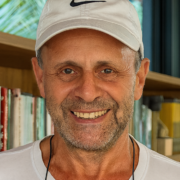
Set against the turbulent backdrop of the Araguaia guerrilla movement, “When the Ashes Fall — Amazonian Misadventures in the Brazilian Night,” by Carlos Augusto Ferreira Galvão , transforms the story of a young doctor in Marabá into a poignant portrait of the violence and silence imposed by the military dictatorship. Blending fiction and historical fact, the novel reveals the weight of armed repression in southern Pará and revives memories of resistance, courage, and suffering that still resonate in contemporary Brazil.
“When the Ashes Fall” takes us to an Amazon in flames—literally and symbolically. What was the process like delving into this dense and painful past to write a narrative that blends fiction and historical fact?
In Belém, I was more concerned with studying and, therefore, somewhat disconnected from politics. I graduated and, like Benedito, went to work in Marabá. There, I faced the reality of the dictatorship. I saw much, heard much, and rebelled against it, unable to do anything about it. That year remained etched in my mind for decades, until one day 30 years ago when I sat down and decided to write a novel about all this experience.
The protagonist, Benedito, is an idealistic doctor who ends up confronting the horrors of the dictatorship. As a doctor yourself, did your own experience ever influence the development of this character?
I lent a lot of my life to the character, but I didn’t have much control over his development, even though I know he came from my own mind. In fact, losing that control made me surprised by the characters. I even experienced this in my second novel. Benedito developed as the text progressed.
The book speaks of memory, courage, and repression. How do you see the role of literature in preserving history, especially in times when there are attempts at revisionism or erasure?
It’s no wonder that authoritarian regimes hate the arts, especially literature, because it describes times and things that the powerful prefer to remain buried. My generation wouldn’t be surprised if someone said the Vargas dictatorship took place on Mars. In this time of revisionism, I do my part, and these are times that have motivated me to recount the things I’ve seen and experienced in my life.
The Araguaia Guerrilla War remains a seldom-discussed episode in Brazilian fiction. What motivated you to choose this region and context as the setting for your novel?
The history of the state where I was born is completely forgotten and heavily manipulated. One example is Admiral Francisco D’Andrea, who in 1835 murdered two-thirds of the population of Pará and is today considered a hero of the Brazilian Navy’s national pacification.

Although the plot is set in the past, there are clear echoes with the present. What reflections do you hope to provoke in younger readers, who didn’t live through the dictatorship?
I want to raise awareness among young people about the dictatorship, which many today even praise. I hope that whoever reads my novel, young or old, will be angered by the dictatorship and wish they never experienced another one in Brazil.
The writing alternates between the poetic and the tragic. Was this duality planned from the beginning, or did it emerge naturally as you pored over the pain and beauty of the story being told?
My “master,” the Finnish novelist Mika Waltari, has this style that (how pretentious, my God) I try to imitate. But poetry is always a tool to “capture” the reader. As for the tragic, it showed itself in that city.
As a psychiatrist, you certainly know firsthand the invisible wounds left by trauma. How has this clinical sensitivity contributed to portraying the psychological damage caused by repression?
They showed up in my office. I consulted young men who told me that, as recruits, they were brutally tortured by the military. When I recently watched the documentary “Soldados do Araguaia,” I felt remorse because I didn’t believe those boys. This is because sexual violence against women is described in literature, unlike the traumas of sexual violence faced by men. In this, I applied my experience in psychiatry.
The title “When the Ashes Fall” evokes what remains after the fire. What do you believe can still blossom from these historic ashes, especially if they are remembered responsibly?
We are a nation that deeply values democratic values. I strive, in my “misguided” endeavors, to expand these values so that we never lose them again.
Follow Carlos Augusto Ferreira Galvão on Instagram


